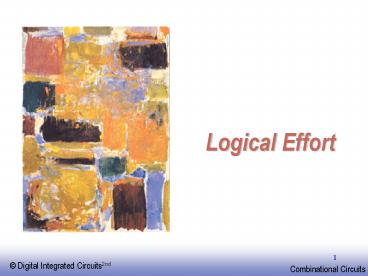Logical Effort - PowerPoint PPT Presentation
1 / 22
Title:
Logical Effort
Description:
Logical effort is a function of topology, independent of sizing ... Logical effort of a gate presents the ratio of its input capacitance to the ... – PowerPoint PPT presentation
Number of Views:77
Avg rating:3.0/5.0
Title: Logical Effort
1
Logical Effort
2
Sizing Logic Paths for Speed
- Frequently, input capacitance of a logic path is
constrained - Logic also has to drive some capacitance
- Example ALU load in an Intels microprocessor is
0.5pF - How do we size the ALU datapath to achieve
maximum speed? - We have already solved this for the inverter
chain can we generalize it for any type of
logic?
3
Buffer Example
In
Out
CL
1
2
N
(in units of tinv)
For given N Ci1/Ci Ci/Ci-1 To find N Ci1/Ci
4 How to generalize this to any logic path?
4
Logical Effort
p intrinsic delay (3kRunitCunitg) - gate
parameter ? f(W) g logical effort (kRunitCunit)
gate parameter ? f(W) f effective
fanout Normalize everything to an inverter ginv
1, pinv 1 Divide everything by
tinv (everything is measured in unit delays
tinv) Assume g 1.
5
Delay in a Logic Gate
Gate delay
d h p
effort delay
intrinsic delay
Effort delay
h g f
logical effort
effective fanout Cout/Cin
Logical effort is a function of topology,
independent of sizing Effective fanout
(electrical effort) is a function of load/gate
size
6
Logical Effort
- Inverter has the smallest logical effort and
intrinsic delay of all static CMOS gates - Logical effort of a gate presents the ratio of
its input capacitance to the inverter capacitance
when sized to deliver the same current - Logical effort increases with the gate complexity
7
Logical Effort
Logical effort is the ratio of input capacitance
of a gate to the input capacitance of an inverter
with the same output current
g 5/3
g 4/3
g 1
8
Logical Effort of Gates
9
Logical Effort of Gates
t
pNAND
g p d
t
pINV
Normalized delay (d)
g p d
F(Fan-in)
1
2
3
4
5
6
7
Fan-out (h)
10
Logical Effort of Gates
t
pNAND
g 4/3 p 2 d (4/3)h2
t
pINV
Normalized delay (d)
g 1 p 1 d h1
F(Fan-in)
1
2
3
4
5
6
7
Fan-out (h)
11
Logical Effort
From Sutherland, Sproull
12
Add Branching Effort
Branching effort
13
Multistage Networks
Stage effort hi gifi Path electrical effort F
Cout/Cin Path logical effort G
g1g2gN Branching effort B b1b2bN Path
effort H GFB Path delay D Sdi Spi Shi
14
Optimum Effort per Stage
When each stage bears the same effort
Stage efforts g1f1 g2f2 gNfN
Effective fanout of each stage
Minimum path delay
15
Optimal Number of Stages
For a given load, and given input capacitance of
the first gate Find optimal number of stages and
optimal sizing
Substitute best stage effort
16
Method of Logical Effort
- Compute the path effort F GBH
- Find the best number of stages N log4F
- Compute the stage effort f F1/N
- Sketch the path with this number of stages
- Work either from either end, find sizes Cin
Coutg/f - Reference Sutherland, Sproull, Harris, Logical
Effort, Morgan-Kaufmann 1999.
17
Example Optimize Path
g 1f a
g 1f 5/c
g 5/3f b/a
g 5/3f c/b
Effective fanout, F G H h a b
18
Example Optimize Path
g 1f a
g 1f 5/c
g 5/3f b/a
g 5/3f c/b
Effective fanout, F 5 G 25/9 H 125/9
13.9 h 1.93 a 1.93 b ha/g2 2.23 c hb/g3
5g4/f 2.59
19
Example Optimize Path
g4 1
g1 1
g2 5/3
g3 5/3
Effective fanout, H 5 G 25/9 F 125/9
13.9 f 1.93 a 1.93 b fa/g2 2.23 c fb/g3
5g4/f 2.59
20
Example 8-input AND
21
Summary
Sutherland, Sproull Harris
22
Exam
- 1. Transistor models, interconnect
- 2. CMOS inverter
- 3. Combinatorial logic
- 4. Sequential logic
- All material covered in lectures examinable
except Week 13 (More combinatorial logic ).
However, you should understand transmission
gates, pass transistors and the principles of
dynamic storage.































